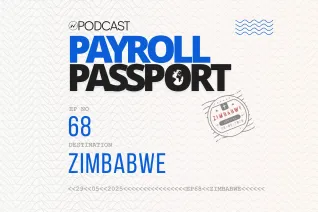Why Global Payroll Compliance Should Be on Every CXO’s Radar

Expanding across borders is a bold and strategic move for any organization, but with that ambition comes a host of complexities, especially in global payroll compliance. From my experience overseeing payroll delivery, I’ve seen how even well-established organizations can stumble when navigating regulatory nuances.
Global payroll compliance isn’t just about timely payments. It’s about safeguarding your business from reputational risks, financial penalties, and employee dissatisfaction. It's a multi-layered challenge that demands vigilance, adaptability, and the right global partner.
The Multi-Faceted Challenge of Global Payroll Compliance
When organizations venture into new markets, payroll becomes exponentially more complex. These are the most common (and costly) hurdles:
Varying Regulations and Requirements: Each country operates under a distinct set of labor laws, tax regulations, social security mandates, and reporting obligations. These can range from minimum wage and overtime standards to mandatory benefits, paid leave, and termination protocols. Navigating these dynamic and multifaceted regulations across multiple jurisdictions is a significant challenge.
For example, Understanding the nuances of income tax withholding in India versus Brazil or the intricacies of the 13th-month pay in the Philippines requires careful and precise management.
Data Privacy and Security: Safeguarding sensitive employee information, including tax IDs and banking details, across diverse jurisdictions demands strict compliance with local data protection laws, such as GDPR in Europe. It is essential to implement robust security protocols and ensure adherence to cross-border data transfer regulations, as failing to do so can lead to severe financial penalties and long-term reputational damage.
Currency Fluctuations and Exchange Rates: Paying employees in their local currencies necessitates a strategic approach to managing currency exchange rate fluctuations, which can directly affect the amount employees receive. Developing and executing risk mitigation strategies to stabilize payments and ensure fair, on-time disbursements is crucial for maintaining employee satisfaction and compliance across global operations.
ALSO READ | Top 7 Global Payroll Challenges
Tax Compliance: Ensuring accurate income tax calculation, withholding, and remittance, along with social security contributions and local taxes for international employees, is a complex and evolving process. Given the constant changes in tax laws and interpretations, staying abreast of the latest developments is critical. Additionally, addressing issues such as permanent establishment risk, where a sustained business presence in a country may trigger local tax obligations, requires strategic oversight.
For example, Managing globally mobile employees demands precision in payroll execution and unwavering compliance with both home and host country regulations—any oversight here can expose the organization to significant financial and reputational risk.
Cultural and Language Barriers: A comprehensive understanding of local customs, cultural practices, and communication preferences related to compensation, benefits, and payroll is vital for seamless operations and protecting our reputation as an employer of choice. Language differences must also be effectively addressed to ensure clear and accurate communication of payroll information across international teams.
System Integration and Data Management: Managing payroll data across disparate, region-specific systems can lead to inefficiencies, inaccuracies, and reduced transparency. The adoption of a centralized system or the integration of payroll with HR and finance systems is essential for ensuring data accuracy, streamlining processes, and enabling more informed decision-making across the organization.
Top 5 Payroll Compliance Imperatives
(Pin this on your compliance dashboard for quick reference.)
- Stay Agile with Regulatory Shifts
The landscape of labor laws, tax codes, and wage standards is constantly evolving. Proactively track global and local regulatory changes to ensure your organization remains compliant, leveraging real-time alerts to stay ahead. - Refine Employee Classification
Accurate employee classification is non-negotiable. Regularly reassess roles to ensure that distinctions between employees and contractors are clear, reducing the risk of costly misclassification penalties. - Guard Your Data with Precision
Maintaining meticulous records of payroll transactions, tax withholdings, and benefits isn’t just about compliance—it’s about safeguarding trust. Implement secure data storage practices to shield sensitive employee information from potential breaches. - Embrace Technology as a Compliance Enabler
Empower your payroll function with automation tools that reduce human error, streamline tax filings, and enhance reporting accuracy. Integrate systems across HR, payroll, and finance to foster a seamless flow of data. - Audit with Purpose and Frequency
Compliance isn’t a one-time check; it’s a continuous effort. Build a culture of regular audits to scrutinize processes, uncover gaps, and fine-tune operations for sustained compliance and efficiency.
DOWNLOAD NOW | Best Practices for Managing a Hybrid Payroll System
Best Practices: Neeyamo’s Proven Approach
Navigating the complexities of global payroll compliance requires a strategic, proactive approach. At Neeyamo, we focus on several key best practices to ensure compliance while optimizing efficiency across our global operations:
- Deep Expertise in Local Regulations
We prioritize a thorough understanding of the employment laws and tax regulations in each country where we operate. Regular monitoring of legislative changes ensures we adapt our practices swiftly and remain fully compliant. - Leverage Advanced Automation
We utilize cutting-edge technologies, such as Gen AI, Machine Learning (ML), and Robotic Process Automation (RPA), to manage multi-country payroll. These tools automate payroll calculations, deductions, and ensure compliance with local laws, driving both efficiency and real-time visibility while minimizing manual errors. - Data Integrity and Security First
Protecting employee payroll data is non-negotiable. We implement rigorous data security measures to ensure compliance with global data privacy regulations and maintain the highest standards of accuracy across all regions. Secure data transfer channels are essential to maintaining trust and compliance. - Clear and Transparent Communication
We believe in fostering open, transparent communication with our global teams. By providing localized support and clear guidance on salaries, deductions, and payroll processes, we ensure our employees and clients are well-informed and confident in our practices. - Multi-Currency Capabilities
Our payroll systems are designed to handle payments in multiple currencies, ensuring that employees receive accurate and timely compensation. By utilizing competitive exchange rates and fast processing times, we facilitate seamless payments in local currencies across all markets. - Timely and Accurate Tax Filing
We employ automated compliance tracking tools and payroll software to manage tax deadlines and ensure the precise and timely filing of tax returns and social security contributions in every jurisdiction where we operate. - Outsource to Global Payroll Experts
For complex global operations, we partner with trusted global payroll service providers or Employers of Record (EOR). These experts bring deep local knowledge and ensure compliance while minimizing risks and optimizing payroll efficiency. - Conduct Regular Compliance Audits
We conduct proactive, periodic audits of our payroll processes to identify potential compliance gaps and rectify issues before they escalate. This ensures we remain fully compliant and uphold the highest standards of payroll integrity. - Stay Ahead of Regulatory Changes
We have established systems to stay updated on the latest changes in international labor laws and tax regulations. Through legal subscriptions, industry newsletters, and partnerships with local experts, we ensure our practices are always in line with evolving global standards. - Clear Policies and Standardized Procedures
We’ve developed clear, standardized payroll policies and procedures that define our approach to global payroll compliance. These guidelines help ensure consistency, transparency, and clarity in how responsibilities are managed across all locations.
ALSO READ | Navigating Payroll Tax Compliance Across Borders: A Global Business Guide
Compliance Is a Growth Enabler
In today's volatile and hyper-connected business landscape, global payroll compliance is no longer a back-office function—it’s a boardroom conversation.
Organizations that prioritize compliance are better positioned to scale sustainably, attract international talent, and protect their reputation. More than ever, payroll teams must be strategic partners, not just processors.
At Neeyamo, our philosophy is clear: The path to global success begins with getting payroll & compliance right.
Key Questions to Assess Your Global Payroll Readiness
If your organization is expanding or already operating globally, ask yourself:
- Are we equipped to handle multi-country compliance?
- Do we have visibility into our global payroll obligations?
- Is our data secure and compliant with international information security standards & local regulations?
If the answer to any of these is uncertain, it’s time to reassess. Reach out to us at irene.jones@neeyamo.com and connect with our global compliance team to explore how we can future-proof your payroll operations—so you can focus on what truly matters: growing your business.
Latest Resources
Stay informed with latest updates
If you're curious and have a thirst for knowledge pertaining to the HR, payroll, and EOR universe, don't miss out on subscribing to our resources.















